

Upload & Share PowerPoint presentations, documents, infographics. MyScienceWork. ImpactStory. MyExperiment. ResearchGate. Figshare. Academia.edu. SciVee. Mahara ePortfolio System. Science3.0 - the future of science. Early careers: eLife showcases junior investigators and their work. Jason Gallivan Position: Post-doc Field: Neuroscience Institution: Queen’s University Current location: Kingston, ON (Canada) Contact: jasongallivan /at/ gmail.com “For all of the challenges that scientists today face (e.g., securing highly competitive grant/award funding, maintaining an appropriate work-life balance, etc.), publishing one’s research in well-respected journals need not be as time consuming and onerous as it currently is.”

I am interested in the cognitive and neural mechanisms that support human perception and action. Given the highly competitive nature of today’s academic job market, the pressure for trainees (i.e., graduate students and postdoctoral fellows) to publish their research in top-tier journals, both frequently and often, is immense. The Internet, peer reviewed. Open Knowledge Maps - A visual interface to the world's scientific knowledge. Dataverse.org. The Dataverse is an open source web application to share, preserve, cite, explore and analyze research data.
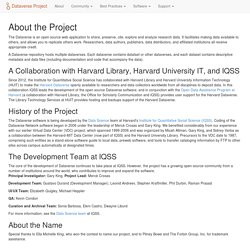
It facilitates making data available to others, and allows you to replicate others work. Researchers, data authors, publishers, data distributors, and affiliated institutions all receive appropriate credit. A Dataverse repository hosts multiple dataverses. Write research documents online, together. Welcome to the Tricki. Overleaf: Real-time Collaborative Writing and Publishing Tools with Integrated PDF Preview. Elements - Our Products - Symplectic. Using our rich range of data sources, researchers can be assured that their publication metadata is kept up-to-date.
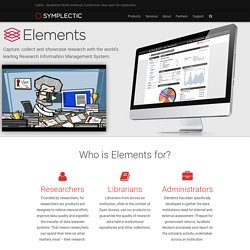
This metadata can be related to other items (such as grants, professional activities and equipment) to create a rich, connected set of data within the system. These can then be exported for use in reporting, public profiles and CV generation. Import existing data Elements supports import of publication data in RefMan, Bibtex and Endnote formats making it easy for a researcher to begin using the system. Our industry-leading ORCID integration also allows for an easy migration of publication data. Elements can utilise existing institutional grants databases to automatically import data while also allowing custom input. As with all other data in the system, grants can be surfaced via the API, linked to other data items, exported in a CV and reported on. Informed fields Elements does not come bundled with a discovery portal or CMS. Integrate with leading portals. ENTERPRISE SAFETY, COMPLIANCE & TRAINING SOFTWARE.
Altmetric - We Make Article Level Metrics Easy. UberResearch. Home - Digital Science. New in the Wolfram Language: WikipediaData—Wolfram Blog. March 20, 2015 — Alan Joyce, Director, Content Development Since the inception of Wolfram|Alpha, Wikipedia has held a special place in its development pipeline.
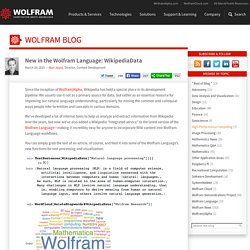
We usually use it not as a primary source for data, but rather as an essential resource for improving our natural language understanding, particularly for mining the common and colloquial ways people refer to entities and concepts in various domains. We’ve developed a lot of internal tools to help us analyze and extract information from Wikipedia over the years, but now we’ve also added a Wikipedia “integrated service” to the latest version of the Wolfram Language—making it incredibly easy for anyone to incorporate Wiki content into Wolfram Language workflows. You can simply grab the text of an article, of course, and feed it into some of the Wolfram Language’s new functions for text processing and visualization: Or if you don’t have a specific article in mind, you can search by title or content: Research4LifeFree Digital Tools for Researchers. Could you imagine doing research without internet?
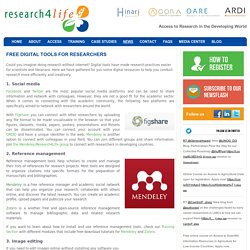
Digital tools have made research practices easier for scientists and librarians. Here we have gathered for you some digital resources to help you conduct research more efficiently and creatively. 1. Social media Facebook and Twitter are the most popular social media platforms and can be used to share information and network with colleagues. DIY Scientific Publishing. Kudos - Researchers. Increase the reach and impact of your publications Kudos is a free service through which you can broaden readership and increase the impact of your research.
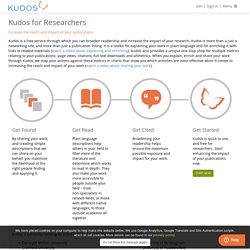
Kudos is more than a just a networking site, and more than just a publication listing. It is a toolkit for explaining your work in plain language and for enriching it with links to related materials (watch a video about explaining and enriching). Kudos also provides a unique one-stop shop for multiple metrics relating to your publications: page views, citations, full text downloads and altmetrics. When you explain, enrich and share your work through Kudos, we map your actions against these metrics in charts that show you which activities are most effective when it comes to increasing the reach and impact of your work (watch a video about sharing your work). Get Found. Publons. Sparrho - Your personalised recommendation engine for science. Standard Analytics IO. DIY Scientific Publishing. Science Exchange - Order experiments from the world's best labs. Metrics. Impactstory: Share the full story of your research impact. ShareLaTeX.
Online collaborative editor. Write papers in LaTeX and Markdown. Track changes in Git. Open Science! Free reference manager & research groups manager.